AUXILIARIES AND MODALS for Class 10 ENGLISH
What are Modals?
Modal are the helping verbs that are used with main verbs of the sentence to express ability, possibility, certainty, permission and necessity.
Modals ऐसी सहायक क्रियाएँ होती हैं जिनका प्रयोग वाक्य में मुख्य क्रिया के साथ किया जाता है ताकि किए जाने वाले कार्य की समर्थता, सम्भावना, निश्चितता, इजाज़त और आवश्यकता व्यक्त की जा सके।
Can (सकता है) / Could (सका, पाया) / Could have (सकता था)
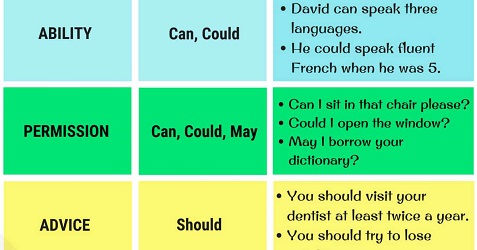
1) Students can come home from school.
1) विद्यार्थी स्कूल से घर आ सकते हैं।
2) People can think wrong about you.
2) लोग तुम्हारे बारे में गलत सोच सकते हैं।
3) Anything could have happened.
3) कुछ भी हो सकता था।
4) You can never love anyone.
4) तुम कभी किसी को प्यार नहीं कर सकते।
May/Might (सकता है) / May have/Might have (सकता था) (Possibility – सम्भावना व्यक्त करने के लिए)
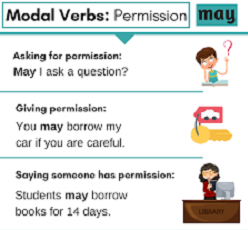
1) It may/might rain today.
1) आज बारिश हो सकती है।
2) It may also happen with you.
2) ये तुम्हारे साथ भी तो हो सकता है।
3) He may have/might have killed anyone.
3) वो किसी को भी मार सकता था।
4) It may/might have rained that day.
4) उस दिन बारिश हो सकती थी।
May (सकता है) (Permission – अनुमति लेने के लिए)
1) May I come in?
1) क्या मैं अन्दर आ सकता हूँ?
2) May I sit?
2) क्या मैं बैठ सकता हूँ?
3) May I have a look at your book once?
3) क्या मैं तुम्हारी किताब एक बार देख सकता हूँ?
May (Wish – इच्छा व्यक्त करने के लिए)
1) May you succeed!
1) भगवान करे आप सफल हो जाएं।
2) May you become a rich man!
2) भगवान आपको बड़ा आदमी बनाए।
3) May God bless you!
3) भगवान आपको आशीर्वाद दे।
4) May you live long!
4) तुम्हें मेरी उम्र लग जाए।
Should (चाहिए) / Should have (चाहिए था)
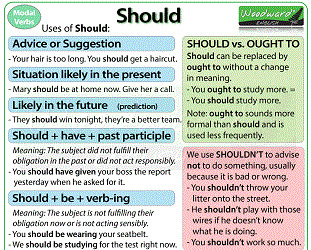
1) You shouldn’t say so.
1) तुम्हें ऐसा नहीं कहना चाहिए।
2) People should leave.
2) लोगों को निकल जाना चाहिए।
3) You should have gone there.
3) तुम्हें वहाँ जाना चाहिए था।
4) You should have at least attended the marriage.
4) तुम्हें कम से कम शादी में तो जाना चाहिए था।
Must (चाहिए ज़रुर) / Must have (चाहिए था ज़रुर)
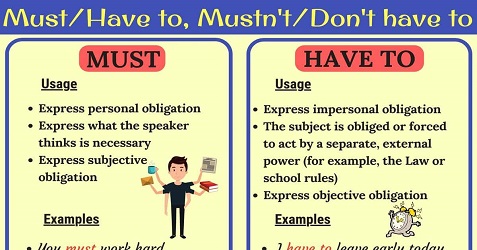
1) Dad is unwell. You must go to see him.
1) पापा बीमार हैं। तुम्हें उन्हें देखने जाना ही चाहिए।
2) We must serve our parents.
2) हमें अपने माता पिता की सेवा करनी चाहिए।
3) You must have come.
3) तुम्हें ज़रुर आना चाहिए था।
IMPORTANT NOTE
If in any sentence of Future Indefinite, Future Continuous or Future Perfect Tense, 'Sure' or 'Sure' is written and you want to translate in Hindi then you don't need to do much, just change 'will' to 'must' And so on if 'maybe' is written, then change 'will' to 'might' or 'may'.
अगर किसी भी Future Indefinite, Future Continuous या Future Perfect Tense के वाक्य में ‘पक्का’ या ‘ज़रुर’ लिखा हो और आपको हिन्दी में अनुवाद करना हो तो ज़्यादा कुछ करने की ज़रुरत नहीं, सिर्फ ‘will’ को ‘must’ में बदल दीजिए और इसी तरह अगर ‘शायद’ लिखा हो, तो ‘will’ को ‘might’ या ‘may’ में बदल दीजिए।
For Example
1) Ram will go.
1) राम जाएगा।
2) Ram must go. (Ram will definitely go.)
2) राम पक्का/ज़रुर जाएगा।
3) Ram may/might go. (Maybe Ram will go.)
3) शायद राम जाएगा। /शायद राम जाए।
Would (बीते हुए कल में कही हुई भविष्य की बात – will की जगह would का प्रयोग) (Something related to future but spoken in past)
1) He said that he would help us.
1) उसने कहा कि वो हमारी मदद करेगा।
2) I knew that he would win.
2) मुझे मालूम था कि वह जीतेगा।
3) I had never thought that he would be this much selfish.
3) मैंने कभी नहीं सोचा था कि वह इतना स्वार्थी होगा।
4) I had no doubt that you would win.
4) मुझे संदेह नहीं था कि तुम जीतोगे।
Would (निवेदन करने के लिए) (For request)
1) Would you please help me?
1) क्या तुम कृपया मेरी मदद करोगे?
2) Would you please open the door?
2) क्या तुम कृपया दरवाजा खोल दोगे?
Used to (किया करता था, करता था)
1) I used to get up early in the morning.
1) मैं सुबह ज़ल्दी उठता था।
2) You used to wake me up.
2) तुम मुझे उठाते थे।
3) We used to play together in childhood.
3) हम बचपन में साथ साथ खेलते थे।
4) He didn’t use to go to school.
4) वो स्कूल नहीं जाता था।
IMPORTANR RULE
RULE:
If 'used to' comes once in a sentence, then 'used to' should not be used again, instead, using 'would' every time is a better option.
अगर वाक्य में एक बार ‘used to’ आ जाये तो ‘used to’ दोबारा प्रयोग नहीं करना चाहिए, उसकी जगह पर हर बार ‘would’ का प्रयोग बेहतर विकल्प है।
For Example:
1) I used to come and he would go.
1) मैं आता था और वो जाता था।
2) I used to get up at 5. Then, I would study for 2 hours.
2) मैं 5 बजे उठ कर दो घंटे पढ़ता था।
Ought to (चाहिए) / Ought to have (चाहिए था)
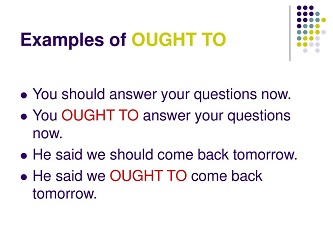
‘Should’ can be replaced with ‘ought to’ but ‘ought to’ is rarely used now.
‘Should’ की जगह ‘ought to’ का प्रयोग भी किया जा सकता है। पर अब ‘ought to’ का प्रयोग अक्सर नहीं होता।
For Example:
1) You ought not to say so.
1) तुम्हें ऐसा नहीं कहना चाहिए।
2) People ought to have left.
2) लोगों को निकल जाना चाहिए था।
Has to/Have to (करना है/करना पड़ता है)
1) We have to go there daily.
1) हमें वहाँ रोज़ जाना पड़ता है।
2) He has to speak politely.
2) उसे प्यार से बात करनी पड़ती है।
3) I have to go.
3) मुझे जाना है।
4) Ram has to come home.
4) राम को घर आना है।
Had to (करना था/करना पड़ता था/करना पड़ा)
1) We had to go there daily.
1) हमें वहाँ रोज़ जाना पड़ता था।
2) I had to go.
2) मुझे जाना था।
3) Had you to do this work?
3) क्या तुम्हें ये काम करना था?
4) Whom had he to meet?
4) उसे किससे मिलना था?
Will have to (करना पडेगा)
1) You will have to face trouble one day.
1) एक दिन तुम्हें परेशानी झेलनी पड़ेगी।
2) I will have to go there one day.
2) मुझे कभी न कभी वहाँ जाना पड़ेगा।
3) Will I have to do this too?
3) क्या मुझे ये भी करना पड़ेगा ?
Dare (हिम्मत करना)
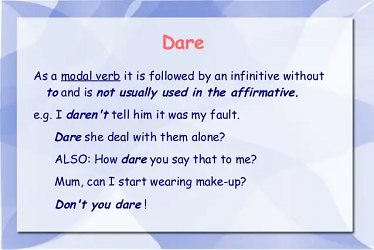
1) He dare not to go there.
1) वो यहाँ जाने की हिम्मत नहीं करता।
2) How dare you come here?
2) तुम्हारी यहाँ आने की हिम्मत कैसे हुई?
3) Ram didn't dare to play.
3) राम ने खेलने की हिम्मत नहीं की।
4) How dare Ram?
4) राम की हिम्मत कैसे हुई ?
When to use Modals
1) Habits:
We can use 'will' and 'would' to talk about habits or things we usually do, or did in the past.
हम आदतों या उन चीजों के बारे में बात करने के लिए 'Will' और 'Would' का उपयोग कर सकते हैं जो हम आमतौर पर करते हैं, या अतीत में करते थे।
Obligation and Advice:
We can use verbs such as 'must' or 'should' to say when something is necessary or unnecessary, or to give advice.
जब कुछ आवश्यक या अनावश्यक हो, या सलाह देने के लिए हम 'Must' या 'Should' जैसे क्रियाओं का उपयोग कर सकते हैं।
Ability:
We use 'can' and 'could' to talk about a skill or ability.
हम किसी कौशल या क्षमता के बारे में बात करने के लिए 'Can' और 'Could' का उपयोग करते हैं।
Practice Exercise
Translate the following sentences.
1. तुम मेरे घर आ सकते थे पर तुम नहीं आए।
2. हमें आज मिलना था।
3. मुझे उससे बात करनी है।
4. उसे किसी भी हालत में वहाँ जाना चाहिए।
5. राहुल को आना पड़ेगा।
6. तुम उसके घर क्यों जाते थे?
7. क्या तुम मुझसे मिलना चाहोगे?
8. शायद वो आज आए।
9. क्या उसे जाना है?
10. अगर मैंने तुम्हें देखा होता, क्या तुमसे बात नहीं करता?
11. मुझे तुम्हारी ज़रुरत नहीं है, बल्कि मुझे तो मेरी माँ चाहिए।
12. उसने कहा था कि वो स्कूल नहीं आएगा।
13. मैं पढ़ने के बजाय खेलना पसन्द करता हूँ।
14. मैं पक्का जाऊँगा वहाँ।
15. मैं जीतना चाहता था पर कभी जीत नहीं पाया।
ANSWER:
1. You could have come my home but you didn't.
2. We had to meet today.
3. I have to talk to him.
4. He must go there at any cost.
5. Rahul will have to come.
6. Why did you use to go his home?
7. Would you like to meet me?
8. He might come today.
9. Has he to go?
10. If I had seen you, wouldn't I have talked to you?
11. I don't need you, rather I need my mom.
12. He had said that he would not come to school.
13. I prefer playing rather than studying.
14. I must go there.
15. I wanted to win but I could never.
Fill in the Blanks
Fill in the blanks with appropriate modals.
1. It is possible that Christopher Marlowe _____________ have written plays for Shakespeare. (might/could)
2. The daughter asked her mother if she _____________ go out. (would/might)
3. Speak slowly lest you ................awake the child. (should/would)
4. Children _____________ take tea at night. (should/must)
5. She came here so that she _____________ (may/might) meet her child.
6. _____________ her soul rest in peace! (Would/ May)
7. They _____________ not read this book for this topic. (need/dare)
8. You _____________ to go to Delhi tomorrow to attend the meeting. (Will have/ should)
9. If you stayed here, you _____________ not face the problem. (would/should)
10. _____________ she had worked hard; she would have passed. (Should/ Must)
ANSWERS:
1. might
2. might
3. should
4. must
5. might
6. May
7. need
8. will have
9. would
10. Should
What are Auxiliary verbs?
An auxiliary verb (or a helping verb as it's also called) is used with a main verb to help express the main verb's tense, mood, or voice.
मुख्य क्रिया के काल, मनोदशा या आवाज़ को व्यक्त करने में मदद करने के लिए इस्तेमाल होने वाली क्रिया को सहायक क्रिया (auxiliary verb) (या हेल्पिंग वर्ब, जैसा कि इसे यह भी कहा जाता है) बुलाया जाता है।
PARAGRAPH 1
The main auxiliary verbs are to be, to have, and to do. They appear in the following forms:
To Be: am, is, are, was, were, being, been, will be
To Have: has, have, had, having, will have
To Do: does, do, did, will do
मुख्य सहायक क्रिया to be, to have और to do है। वे निम्नलिखित रूपों में प्रकट होते हैं:
टू बी (to be): am, is, are, was, were, being, been, will be
टू हैव (to have): has, have, had, having, will have
करने के लिए (to do): does, do, did, will do
PARAGRAPH 2
There is another kind of auxiliary verb called a modal auxiliary verb (or modal verb). The modal auxiliary verbs are can, could, may, might, must, ought to, shall, should, will, and would. The modal auxiliary verbs never change their forms.
एक अन्य प्रकार की सहायक क्रिया है जिसे मोडल सहायक क्रिया (या मोडल क्रिया) कहा जाता है। मोडल सहायक क्रिया can, could, may, might, must, ought to (चाहिए), shall, should, will, और would है। मोडल सहायक क्रिया कभी भी अपना रूप नहीं बदलती।
PARAGRAPH 3
Examples of Auxiliary Verbs Expressing Tense
Here are some examples of auxiliary verbs expressing tense. In these examples, the main verbs are in bold and the auxiliary verbs are underlined.
She was waiting for an hour.
She is waiting in the hall.
She will be waiting outside.
(In each of these examples, the auxiliary verb to be helps to form the progressive tense, which is the tense used for ongoing actions.)
काल को व्यक्त करने वाली सहायक क्रियाओं के उदाहरण
यहां काल को व्यक्त करने वाली सहायक क्रियाओं के कुछ उदाहरण दिए गए हैं। इन उदाहरणों में, मुख्य क्रिया बोल्ड में हैं और सहायक क्रियाओं को रेखांकित किया गया है।
वह एक घंटे से प्रतीक्षा कर रही थी।
वह हॉल में प्रतीक्षा कर रही है।
वह बाहर प्रतीक्षा कर रही होगी।
(इनमें से प्रत्येक उदाहरण में, सहायक क्रिया प्रोग्रेसिव टेंस बनाने में मदद करता है, जो कि चल रही क्रियाओं के लिए उपयोग किया जाने वाला काल है।)
PARAGRAPH 4
She had drunk it before we arrived.
She has drunk it already.
She will have drunk it by then.
(In each of these examples, the auxiliary verb to have helps to form the perfect tense, which is the tense used for expressing an action's completion.)
हमारे आने से पहले उसने इसे पी लिया था।
उसने इसे पहले ही पी लिया है।
उसने तब तक इसे पी लिया होगा।
(इनमें से प्रत्येक उदाहरण में, सहायक क्रिया परफेक्ट टेंस बनाने में मदद करता है, जो किसी क्रिया की पूर्णता को व्यक्त करने के लिए प्रयुक्त होने वाला टेंस है।)
PARAGRAPH 5
She had been studying before the incident.
She has been studying.
She will have been studying for a month at that point.
(In each of these examples, the auxiliary verbs have helped to form the perfect progressive tense, which is the tense used for expressing an ongoing action completion.)
वह घटना से पहले पढ़ रही थी।
वह पढ़ रही है।
वह उस समय एक महीने के लिए पढ़ रही होगी।
(इनमें से प्रत्येक उदाहरण में, सहायक क्रिया have और been ने परफेक्ट प्रोग्रेसिव टेंस बनाने में मदद की, जो किसी चल रही क्रिया के पूरा होने को व्यक्त करने के लिए उपयोग किया जाने वाला टेंस है।)
PARAGRAPH 6
Here are some examples of auxiliary verbs expressing voice.
Our dessert was eaten by the dog.
The geese are driven through the snicket.
The phone will be disconnected tomorrow.
(In these examples, the auxiliary verb to be helps to form the passive voice. A verb is said to be in the passive voice when its subject does not perform the action of the verb but has the action done to it.)
आवाज़ व्यक्त करने वाली सहायक क्रियाओं के कुछ उदाहरण यहां दिए गए हैं।
हमारी मिठाई कुत्ते द्वारा खाई गई थी।
गीज़ को स्निकेट के माध्यम से चलाया जाता है।
फ़ोन कल काट दिया जाएगा।
(इन उदाहरणों में, सहायक क्रिया होने के लिए पैसिव वॉइस बनाने में मदद करती है। एक क्रिया को पैसिव वॉइस में तब कहा जाता है जब उसका विषय (subject) क्रिया का कार्य नहीं करता है, लेकिन उस पर एक्शन किया जाता है।)
PARAGRAPH 7
Examples of Auxiliary Verbs Expressing Mood
Here are some examples of auxiliary verbs being used to express mood.
Did you win?(Here, the auxiliary verb to do is used to form the interrogative mood, i.e., to ask a question.)
Don't forget your wallet.
(Here, the auxiliary verb to do (in its negative form) is used to form the imperative mood, i.e., to give an order.)
मूड को व्यक्त करने वाली सहायक क्रियाओं के उदाहरण
यहां मूड को व्यक्त करने के लिए उपयोग की जाने वाली सहायक क्रियाओं के कुछ उदाहरण दिए गए हैं।
क्या आप जीत गए?(यहां, सहायक क्रिया का उपयोग इंटररोगेटिव मूड बनाने के लिए किया गया है, अर्थात, एक प्रश्न पूछने के लिए।)
अपना बटुआ न भूलें।
(यहां, सहायक क्रिया (इसके नकारात्मक रूप में) का उपयोग आदेशात्मक मनोदशा बनाने के लिए किया गया है, अर्थात आदेश देने के लिए।)
PARAGRAPH 8
Examples of Modal Auxiliary Verbs
Let's now look at the modal auxiliary verbs. Modal auxiliary verbs combine with other verbs to express ideas such as necessity, possibility, intention, and ability. In each example below, the verb phrase is in bold and the modal auxiliary verb is underlined.
मोडल सहायक क्रियाओं के उदाहरण
आइए अब मोडल सहायक क्रियाओं को देखें। आवश्यकता, संभावना, इरादा और क्षमता जैसे विचारों को व्यक्त करने के लिए मोडल सहायक क्रियाएं अन्य क्रियाओं के साथ मिलती हैं। नीचे दिए गए प्रत्येक उदाहरण में, क्रिया वाक्यांश बोल्ड में है और मोडल सहायक क्रिया को रेखांकित किया गया है।
PARAGRAPH 9
Modal auxiliary verbs expressing necessity:
It is during our darkest moments that we must focus to see the light. (Greek philosopher Aristotle)
I don't say we all ought to misbehave, but we ought to look as if we could. (Actor Orson Welles)
A baby is God's opinion that life should go on. (American Poet Carl Sandburg)
आवश्यकता व्यक्त करने वाली मोडल सहायक क्रियाएं:
हमारे सबसे अंधेरे क्षणों के दौरान है कि हमें प्रकाश को देखने के लिए ध्यान केंद्रित करना चाहिए। (यूनानी फिलॉसफर एरिस्टोटल)
मैं यह नहीं कहता कि हम सभी को दुर्व्यवहार करना चाहिए, लेकिन हमें ऐसा दिखना चाहिए जैसे हम कर सकते हैं। (अभिनेता ओर्सन वेल्स)
एक बच्चा भगवान की राय है कि जीवन चलते रहना चाहिए। (अमेरिकी कवि कार्ल सैंडबर्ग)
PARAGRAPH 10
Modal auxiliary verbs expressing possibility:
It is never too late to be what you might have been. (George Eliot)
If there were no bad people, there would be no good lawyers. (Author Charles Dickens)
संभावना व्यक्त करने वाली मोडल सहायक क्रियाएं:
आप जो हो सकते थे उसे होने में कभी देर नहीं होती। (जॉर्ज एलियट)
अगर बुरे लोग नहीं होते, तो अच्छे वकील भी नहीं होते। (लेखक चार्ल्स डिकेंस)
PARAGRAPH 11
Modal auxiliary verbs expressing intentions:
We shall heal our wounds, collect our dead and continue fighting. (Founding father of the People's Republic of China Mao Zedong)
इरादे व्यक्त करने वाली मोडल सहायक क्रियाएं:
हम अपने घावों को ठीक करेंगे, अपने मृतकों को इकट्ठा करेंगे और लड़ते रहेंगे। (पीपुल्स रिपब्लिक ऑफ चाइना माओ जेडॉन्ग के संस्थापक पिता)
PARAGRAPH 12
Modal auxiliary verbs expressing ability:
No one can feel as helpless as the owner of a sick goldfish. (Cartoonist Kin Hubbard)
Well, either side could win it, or it could be a draw. (Football manager Ron Atkinson)
(Sometimes, more than one sense is expressed. Here, could expresses both ability and possibility.)
Be, have and do are not always auxiliary verbs. Here they are as the main verbs (in bold) being supported by auxiliary modal verbs (underlined).
क्षमता व्यक्त करने वाली मोडल सहायक क्रियाएं:
कोई भी बीमार सुनहरी मछली (गोल्डफिश) के मालिक के बराबर असहाय महसूस नहीं कर सकता है। (कार्टूनिस्ट किन हबर्ड)
खैर, कोई भी पक्ष इसे जीत सकता है, या यह ड्रॉ हो सकता है। (फुटबॉल प्रबंधक रॉन एटकिंसन)
(कभी-कभी, एक से अधिक भाव व्यक्त किए जाते हैं। यहां, क्षमता और संभावना दोनों को व्यक्त किया गया है।)
Be, have और do हमेशा सहायक क्रिया नहीं होते हैं। यहाँ वे मुख्य क्रिया के रूप में हैं (बोल्ड में) सहायक मोडल क्रियाओं (रेखांकित) द्वारा समर्थित हैं।
PARAGRAPH 13
I have inspiration. If I was educated, I would be a damn fool. (Musician Bob Marley)
I really like vampire books. I might have a problem. (Irish writer Sarah Rees Brennan)
If you can dream it, you can do it. (Enzo Ferrari)
मेरे पास प्रेरणा है। अगर मैं शिक्षित होता, तो मैं एक मूर्ख होता।(संगीतकार बॉब मार्ले)
मुझे वास्तव में वैम्पायर किताबें पसंद हैं। मुझे समस्या हो सकती है। (आयरिश लेखिका सारा रीस ब्रेनन)
यदि आप सपना देख सकते हैं, तो आप इसे कर सकते हैं। (एंज़ो फेरारी)
PARAGRAPH 14
There's another related term we should cover: verb phrase. A verb phrase is made up of the main verb and any auxiliary verbs. Any adverbs that appear alongside or inside a verb phrase are not part of the verb phrase. In each example below, the verb phrase is in bold with auxiliary verbs underlined.
Rose has been drinking heavily since breakfast.
(The adverb heavily is not part of the verb phrase.)
Peter is definitely taking you to the airport.
(The adverb definitely is not part of the verb phrase.)
एक और संबंधित शब्द है जिसे हमें कवर करना चाहिए: क्रिया वाक्यांश। एक क्रिया वाक्यांश मुख्य क्रिया और किसी भी सहायक क्रिया से बना होता है। कोई क्रिया विशेषण जो क्रिया वाक्यांश के साथ या उसके अंदर दिखाई देती है, वह क्रिया वाक्यांश का हिस्सा नहीं है। नीचे दिए गए प्रत्येक उदाहरण में, क्रिया वाक्यांश बोल्ड में है और सहायक क्रियाओं को रेखांकित किया गया है।
रोज़ नाश्ते के बाद से बहुत पी रही है।
(क्रिया विशेषण बहुत क्रिया वाक्यांश का हिस्सा नहीं है।)
पीटर निश्चित रूप से हवाई अड्डे पे ले जा रहा है।
(क्रिया विशेषण निश्चित रूप से क्रिया वाक्यांश का हिस्सा नहीं है।)
PARAGRAPH 15
Why Should I Care about Auxiliary Verbs?
I'd wager you use auxiliary verbs and modal auxiliary verbs without giving them a second thought, so I'm mindful that this page has covered a lot of gumpf that you don't really need. Well, that's true provided we're talking about working in English. If you start learning a foreign language, it won't be too long before you'll be unpicking how they express tense, voice and mood. And, do you know what's a good starting point for that? Understanding how we do it.
मुझे सहायक क्रियाओं की परवाह क्यों करनी चाहिए?
मैं शर्त लगाता हूँ कि आप सहायक क्रियाओं और मोडल सहायक क्रियाओं का उपयोग उन्हें कोई दूसरा विचार दिए बिना करते हैं, इसलिए मुझे लगता है कि इस पृष्ठ में बहुत सारे अनियमित शामिल है जिसकी आपको वास्तव में ज़रूरत नही है। खैर, यह सच है हम अंग्रेज़ी में काम करने की बात कर रहे हों। यदि आप एक विदेशी भाषा सीखना शुरू करते हैं, तो आपको यह चुनने में ज़्यादा समय नहीं लगेगा कि वे तनाव, वॉइस और मनोदशा को कैसे व्यक्त करते हैं। और, क्या आप जानते हैं कि इसके लिए एक अच्छी शुरुआत क्या है? यह समझना कि हम इसे कैसे करते हैं।
PARAGRAPH 16
That said, there are three noteworthy points related to auxiliary verbs.
(Point 1) Don't write could of, should of, or would of.
If you ever write could of, should of, or would of, you're toast. It's a writing howler. It's could've (a contraction of could have), should've (should have), or would've (would have).
उस ने कहा, सहायक क्रियाओं से संबंधित तीन उल्लेखनीय प्वाइंट हैं।
(प्वाइंट 1) can of, should of, या would of मत लिखिए।
यदि आप कभी भी लिखते हैं, could of, should of, या would of, आप टोस्ट है। यह एक लेखन की बहुत बड़ी गलती है। यह हो सकता था (हो सकता था (could've) का संकुचन), should've (should have, होना चाहिए), या would've (would have, होना चाहिए)।
PARAGRAPH 17
(Point 2) Use can for ability and may for permission.
Can is a modal auxiliary verb meaning to be able to. May is a modal auxiliary verb meaning to be permitted to.
I can whistle.
(I have the ability to whistle.)
May I have a biscuit?
(Am I permitted to have a biscuit?)
"Can I go outside, grandma?"
"You can, dear. You're just not allowed."
(प्वाइंट 2) क्षमता के लिए can का उपयोग करें और अनुमति के लिए may का प्रयोग करें।
Can एक मोडल सहायक क्रिया है जिसका अर्थ है सक्षम (be able to) होना। May एक सहायक क्रिया है जिसका अर्थ है अनुमति दी जानी चाहिए (be permitted to)।
मैं सीटी बजा सकता हूं।
(मेरे पास सीटी बजाने की क्षमता है।)
क्या मुझे बिस्कुट मिल सकता है?
(क्या मुझे एक बिस्कुट लेने की अनुमति है?)
"क्या मैं बाहर जा सकता हूँ, दादी?"
"तुम जा सकते हो, प्रिय। तुम्हें अनुमति नहीं है।"
PARAGRAPH 18
Nowadays, can is often used for permission, especially in an informal setting.
Can I have a biscuit, grandma?
"You can, dear. You're just not allowed one."
आजकल, can का उपयोग अक्सर अनुमति के लिए किया जाता है, विशेष रूप से अनौपचारिक सेटिंग में।
क्या मुझे बिस्कुट मिल सकता है, दादी?
"आप कर सकते हैं, प्रिय। आपको बस अनुमति नहीं है।"
PARAGRAPH 19
(Point 3) Expand can't to 'cannot not'
Cannot (one word) is the most common expansion of the contraction can't.
You cannot escape the responsibility of tomorrow by evading it today. (US President Abraham Lincoln)
There cannot be a crisis next week. My schedule is already full. (US statesman Henry Kissinger)
(प्वाइंट 3) एक्सपैंड can't टू cannot to कर सकते हैं।
Can (एक शब्द) संकुचन का सबसे आम विस्तार नहीं हो सकता।
आप आज से बचकर कल की जिम्मेदारी से नहीं बच सकते। (अमेरिकी राष्ट्रपति अब्राहम लिंकन)
अगले हफ्ते कोई संकट नहीं हो सकता। मेरा शेड्यूल पहले से ही भरा हुआ है। (अमेरिकी राजनेता हेनरी किसिंजर)
PARAGRAPH 20
Can't can also be expanded to can not (i.e., two words), but this is less common and usually reserved for emphasis.
I cannot do it!
(Can't is usually expanded to cannot.)
I can not do it!
(This is considered more emphatic.)
Can't को हम can not में भी विस्तारित रूप में लिख सकते है (अर्थात, दो शब्द), लेकिन यह कम सामान्य है और आमतौर पर ज़ोर देने के लिए आरक्षित है।
मैं यह नहीं कर सकता! (I cannot do it!)
(आमतौर पर इसका विस्तार नहीं किया जा सकता है।)
मैं यह नहीं कर सकता! (I can not do it!)
(इसे अधिक प्रभावशाली माना जाता है।)
PARAGRAPH 21
Of course, the words can and not sometimes appear alongside each other when the not forms part of another construction (such as not only).
Kevin can not only rap but dance too.
(Here, can not must be written as two words. It's not an expansion of can't.)
बेशक, शब्द can और not कभी-कभी एक-दूसरे के साथ दिखाई दे सकते हैं और नॉट (not) दूसरे निर्माण का हिस्सा होते हैं (जैसे कि not only)।
केविन न केवल रैप कर सकते हैं बल्कि नृत्य भी कर सकते हैं।
(यहाँ, दो शब्दों के रूप में नहीं लिखा जा सकता है। यह can't का विस्तार नहीं है।)
EXERCISE
Q1. Complete the following sentences using an appropriate auxiliary verb form.
1. You have been riding non-stop for hours. You ………………….. be very tired.
2. She ………………… be about forty.
3. I know I left my phone on this table and it is not here now. Somebody ………………… it.
4. That ………………… be true. She will never do something like that.
5. You …………………. him a fool. It really upset him.
6. The doctor said I ………………. give up smoking.
7. You ………………… nicer to her. She really cares for you.
8. ……………….. you mind standing up for a moment?
9. That was a bad place to go hiking. You …………………. your back.
10. ‘Who is at the door?’ ‘It …………………. be the postman.’
Answers:
1. You have been riding non-stop for hours. You must be very tired.
2. She must be about forty.
3. I know I left my phone on this table and it is not here now. Somebody must have taken it.
4. That can’t be true. She will never do something like that.
5. You shouldn’t have called him a fool. It really upset him.
6. The doctor said I must give up smoking.
7. You should have been nicer to her. She really cares for you.
8. Would you mind standing up for a moment?
9. That was a bad place to go hiking. You could have broken your back.
10. ‘Who is at the door?’ ‘It must / could be the postman.’ (Use must if you are certain that the person at the door is the postman. Use could to express possibility.)
Q2. Fill in the blanks with appropriate forms of be, have and do.
1. I will go to Chicago after I .................................... finished my work here.
2. She ........................................... playing the piano when I entered her room.
3. The patient .................................... died before the doctor came.
4. ...................................... you ever been to Kashmir?
5. That is what he ......................................... not seem to understand.
6. They ....................................... say that they would pay up.
7. I will call you when dinner ........................................ ready.
8. She asked where I .................................. going.
9. ......................................... you know where John lives?
10. I .......................................... admit that I was wrong.
ANSWERS:
1. I will go to Chicago after I have finished my work here.
2. She was playing the piano when I entered her room.
3. The patient had died before the doctor came.
4. Have you ever been to Kashmir?
5. That is what he does not seem to understand.
6. They did say that they would pay up.
7. I will call you when dinner is ready.
8. She asked where I was going.
9. Do you know where John lives?
10. I do admit that I was wrong.
Q3. Fill in the correct Auxiliary
A. Tell me, ________ you coming to the party?
B. They ________ finished the job.
C. What ___________ you do every Sunday?
D. I ________ like to watch TV. There is a good film on.
E. She ________ not want to stay at home. She wants to go out with her friends.
F. He _________ called me twice this morning.
G. What __________ she do in her free time?
H. Where _______ they go yesterday?
I. She ________ always wanted to meet him.
J. What ____________ they doing when you came in?
ANSWERS: a) are, b) have, c) do, d) would, e) does, f) has, g) does, h) did, i) has, j) were